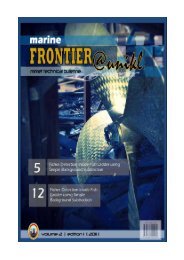click here to download - UniKL MIMET Official Website
click here to download - UniKL MIMET Official Website
click here to download - UniKL MIMET Official Website
You also want an ePaper? Increase the reach of your titles
YUMPU automatically turns print PDFs into web optimized ePapers that Google loves.
duce wear due <strong>to</strong> metal‐<strong>to</strong>‐metal contact thus<br />
prolonging the life of the equipments. Most hy‐<br />
draulic fluids have anti‐wear additive added <strong>to</strong> it<br />
<strong>to</strong> obtain anti wear properties.<br />
Most common anti wear additive for petroleum<br />
based fluid is the zinc dithiophosphate (ZDP)<br />
which is a highly <strong>to</strong>xic substance. As it is soluble in<br />
water, its introduction <strong>to</strong> marine environment<br />
can be hazardous.<br />
Corrosion<br />
A good hydraulic fluid has good hydrolytic stabil‐<br />
ity i.e. able <strong>to</strong> prevent any water which may enter<br />
the fluid from causing rust <strong>to</strong> metal. Usually, a<br />
rust inhibi<strong>to</strong>r is added <strong>to</strong> the fluid <strong>to</strong> obtain good<br />
rust protection.<br />
Oxidation<br />
The presence of water and oxygen (air) in the<br />
fluid may cause fluids <strong>to</strong> oxidize and further in‐<br />
crease the chance of rust formation. Oxidize fluid<br />
will also cause chemical corrosions due <strong>to</strong> in‐<br />
crease in acidity.<br />
Flammability<br />
A high flash point (the maximum temperature<br />
before ignition) is necessary for hydraulic fluid as<br />
most fluid works at high temperatures. Petro‐<br />
leum based fluid have a relatively high flash<br />
point of around 150 o C. For extreme environ‐<br />
ments, a fire resistant fluid is required <strong>to</strong> prevent<br />
accidental ignitions.<br />
Effect of Mineral Based Fluid on Marine Environ‐<br />
ment<br />
Hydraulic fluids can enter the environment<br />
from spills and leaks in machines and from leaky<br />
s<strong>to</strong>rage tanks. When these fluids spilled on soil,<br />
some of the ingredients in the hydraulic fluids<br />
mixture may stay on the <strong>to</strong>p, while others may<br />
sink in<strong>to</strong> the groundwater. In water, some in‐<br />
gredients of hydraulic fluids will transfer <strong>to</strong> the<br />
<strong>MIMET</strong> Technical Bulletin Volume 1 (2) 2010<br />
bot<strong>to</strong>m and stay t<strong>here</strong>. Marine organism that<br />
live near spillage area may ingest some hydrau‐<br />
lic fluid ingredients. Some organism may die<br />
from the poisoning and some will have traces of<br />
the hydraulic fluid in their system causing defor‐<br />
mations or poisoning the upper food chains.<br />
Eventually, the hydraulic fluids will degrade in<br />
the environment, but complete degradation<br />
may take more than a year and continue <strong>to</strong> af‐<br />
fect living organism during the degradation<br />
process [7]. Prolong contact with human can<br />
increase cancer risk especially on skin [8]. The<br />
International Convention for the Prevention of<br />
Pollution From Ships, 1973 (MARPOL 73/78)<br />
forbid the discharge of oily waste <strong>to</strong> the sea<br />
which cover all petroleum products in any<br />
forms [9].<br />
Vegetable‐based Fluid<br />
In order <strong>to</strong> be accepted as a fluid of choice for<br />
hydraulic application, vegetable based fluid must<br />
have similar characteristics as the commonly<br />
used petroleum based hydraulic fluid. As men‐<br />
tioned earlier, the purpose of the hydraulic fluids<br />
is <strong>to</strong> maintain appropriate pressure <strong>to</strong> operate<br />
actua<strong>to</strong>rs and at the same time lubricate and<br />
protect moving mechanical parts from wear and<br />
corrosion. To maintain the pressure, the fluids<br />
are constantly pumped thus creating a built up<br />
of heat, subjecting the fluid <strong>to</strong> temperature<br />
variations and also constant mechanical stresses<br />
[4].<br />
Vegetable oil provides better anti‐wear perform‐<br />
ance and generally exhibit lower friction coeffi‐<br />
cient and are easily biodegradable. These prop‐<br />
erties are due <strong>to</strong> the composition of the oils<br />
which contain unsaturated hydrocarbons and<br />
naturally occurring esters. The problems are that<br />
t<strong>here</strong> are prone <strong>to</strong> oxidize rapidly, changes in<br />
viscosity at the lower and upper temperature<br />
range and low water resistance. Vegetable es‐<br />
ters oils based on polyunsaturated fatty acid<br />
| MARINE FRONTIER @ <strong>UniKL</strong><br />
64



